King's Own Institute MGT200: Financial Rewards and Employee Motivation
VerifiedAdded on 2023/01/19
|8
|2286
|24
Essay
AI Summary
This research essay critically examines the role of money and other financial rewards in employee motivation within the framework of organizational behaviour. It explores the pros and cons of using monetary incentives to enhance work performance and establish positive employment relationships. The essay delves into various theories, including expectancy theory, agency theory, Maslow's hierarchy of needs, and social-cognitive theory, to analyze how financial rewards impact employee behaviour, job satisfaction, and organizational outcomes. It discusses the advantages of monetary rewards, such as fulfilling basic needs, driving performance, and fostering competitiveness, while also addressing potential drawbacks, such as the cost to firms, potential for inequity, and the limitations of money as a long-term motivator. The essay concludes that while financial rewards are undeniably important, a comprehensive approach that considers employee performance, workplace behaviour, and ethical considerations is crucial for fostering sustainable motivation and achieving workplace excellence.
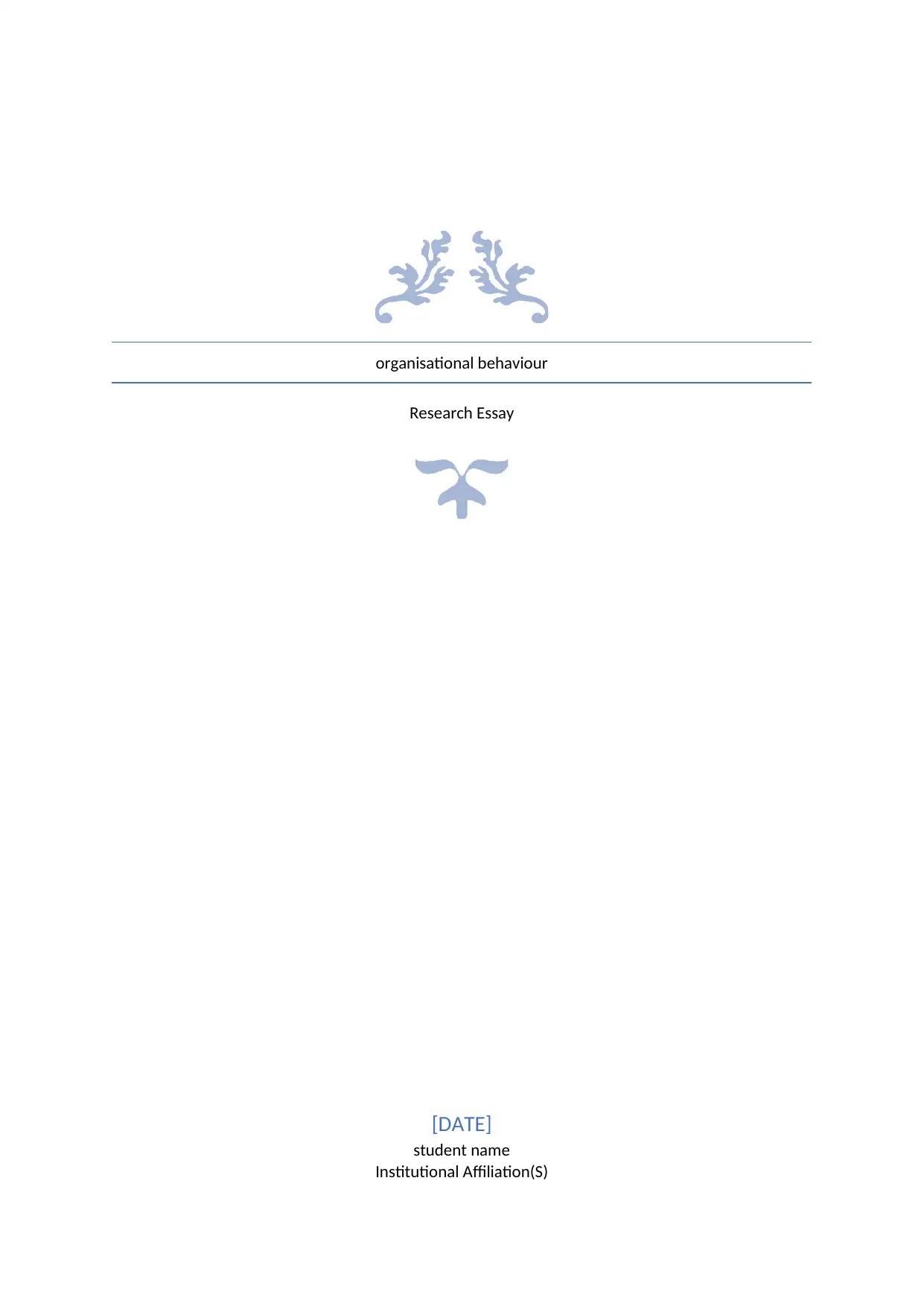
organisational behaviour
Research Essay
[DATE]
student name
Institutional Affiliation(S)
Research Essay
[DATE]
student name
Institutional Affiliation(S)
Paraphrase This Document
Need a fresh take? Get an instant paraphrase of this document with our AI Paraphraser
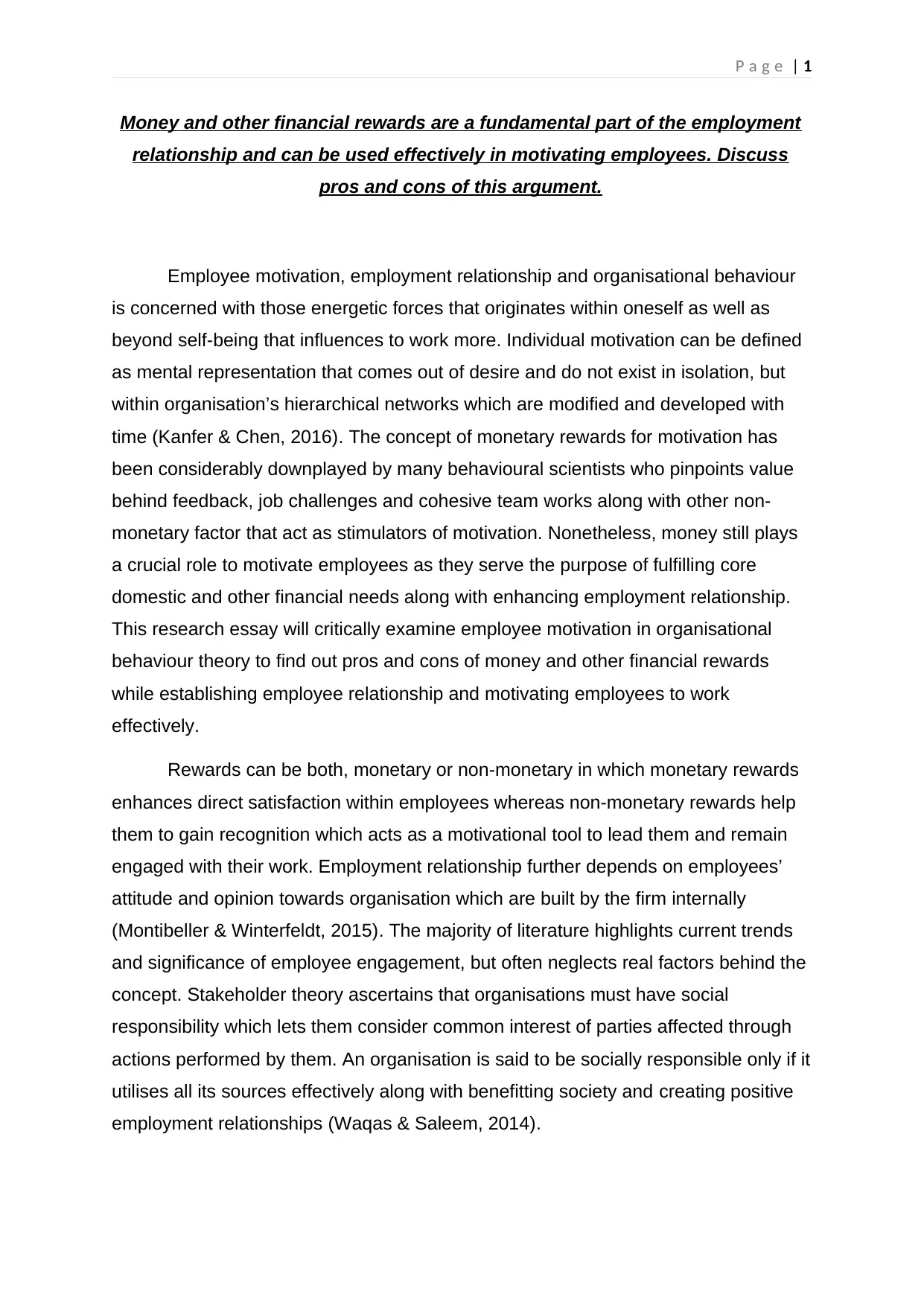
P a g e | 1
Money and other financial rewards are a fundamental part of the employment
relationship and can be used effectively in motivating employees. Discuss
pros and cons of this argument.
Employee motivation, employment relationship and organisational behaviour
is concerned with those energetic forces that originates within oneself as well as
beyond self-being that influences to work more. Individual motivation can be defined
as mental representation that comes out of desire and do not exist in isolation, but
within organisation’s hierarchical networks which are modified and developed with
time (Kanfer & Chen, 2016). The concept of monetary rewards for motivation has
been considerably downplayed by many behavioural scientists who pinpoints value
behind feedback, job challenges and cohesive team works along with other non-
monetary factor that act as stimulators of motivation. Nonetheless, money still plays
a crucial role to motivate employees as they serve the purpose of fulfilling core
domestic and other financial needs along with enhancing employment relationship.
This research essay will critically examine employee motivation in organisational
behaviour theory to find out pros and cons of money and other financial rewards
while establishing employee relationship and motivating employees to work
effectively.
Rewards can be both, monetary or non-monetary in which monetary rewards
enhances direct satisfaction within employees whereas non-monetary rewards help
them to gain recognition which acts as a motivational tool to lead them and remain
engaged with their work. Employment relationship further depends on employees’
attitude and opinion towards organisation which are built by the firm internally
(Montibeller & Winterfeldt, 2015). The majority of literature highlights current trends
and significance of employee engagement, but often neglects real factors behind the
concept. Stakeholder theory ascertains that organisations must have social
responsibility which lets them consider common interest of parties affected through
actions performed by them. An organisation is said to be socially responsible only if it
utilises all its sources effectively along with benefitting society and creating positive
employment relationships (Waqas & Saleem, 2014).
Money and other financial rewards are a fundamental part of the employment
relationship and can be used effectively in motivating employees. Discuss
pros and cons of this argument.
Employee motivation, employment relationship and organisational behaviour
is concerned with those energetic forces that originates within oneself as well as
beyond self-being that influences to work more. Individual motivation can be defined
as mental representation that comes out of desire and do not exist in isolation, but
within organisation’s hierarchical networks which are modified and developed with
time (Kanfer & Chen, 2016). The concept of monetary rewards for motivation has
been considerably downplayed by many behavioural scientists who pinpoints value
behind feedback, job challenges and cohesive team works along with other non-
monetary factor that act as stimulators of motivation. Nonetheless, money still plays
a crucial role to motivate employees as they serve the purpose of fulfilling core
domestic and other financial needs along with enhancing employment relationship.
This research essay will critically examine employee motivation in organisational
behaviour theory to find out pros and cons of money and other financial rewards
while establishing employee relationship and motivating employees to work
effectively.
Rewards can be both, monetary or non-monetary in which monetary rewards
enhances direct satisfaction within employees whereas non-monetary rewards help
them to gain recognition which acts as a motivational tool to lead them and remain
engaged with their work. Employment relationship further depends on employees’
attitude and opinion towards organisation which are built by the firm internally
(Montibeller & Winterfeldt, 2015). The majority of literature highlights current trends
and significance of employee engagement, but often neglects real factors behind the
concept. Stakeholder theory ascertains that organisations must have social
responsibility which lets them consider common interest of parties affected through
actions performed by them. An organisation is said to be socially responsible only if it
utilises all its sources effectively along with benefitting society and creating positive
employment relationships (Waqas & Saleem, 2014).
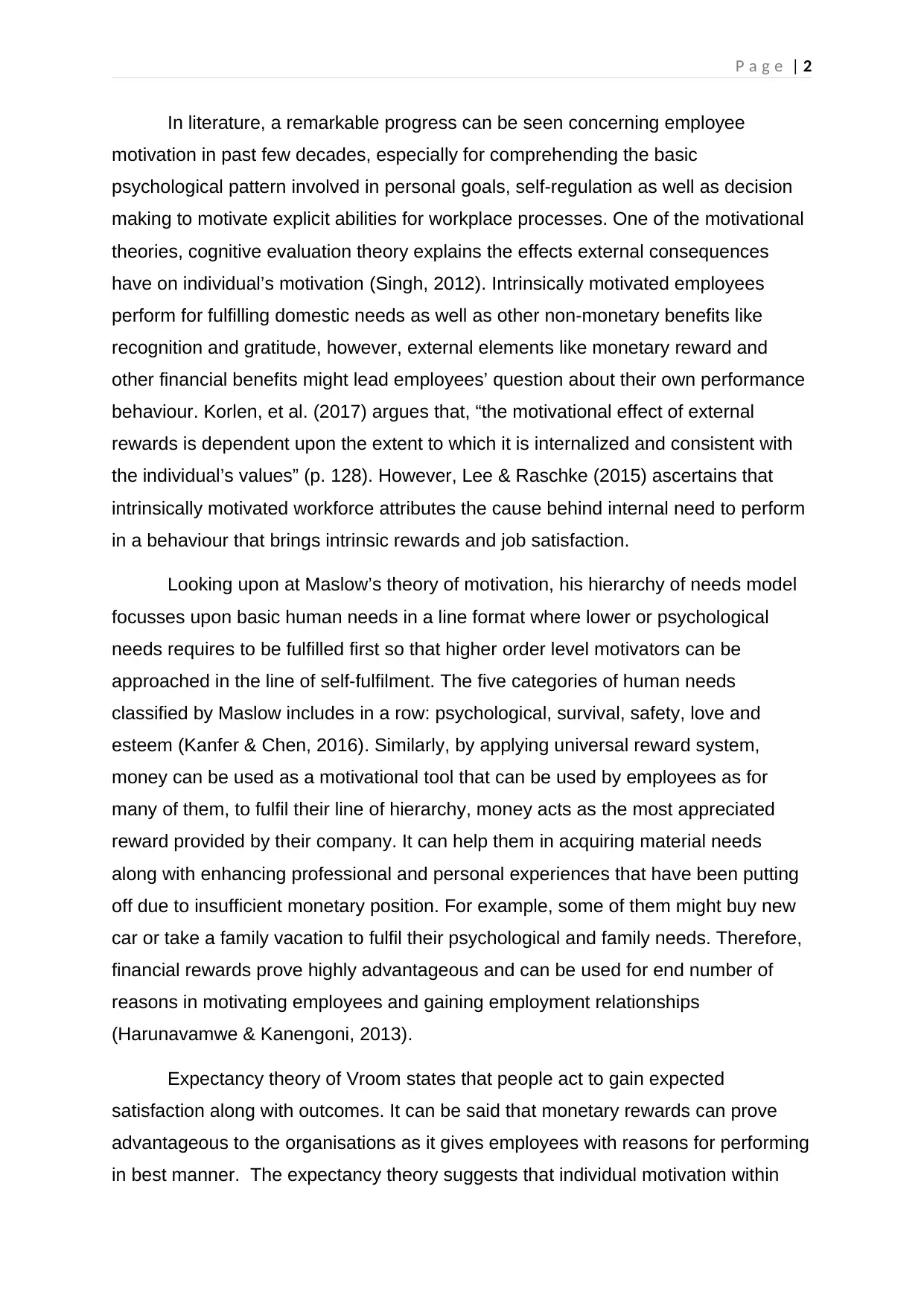
P a g e | 2
In literature, a remarkable progress can be seen concerning employee
motivation in past few decades, especially for comprehending the basic
psychological pattern involved in personal goals, self-regulation as well as decision
making to motivate explicit abilities for workplace processes. One of the motivational
theories, cognitive evaluation theory explains the effects external consequences
have on individual’s motivation (Singh, 2012). Intrinsically motivated employees
perform for fulfilling domestic needs as well as other non-monetary benefits like
recognition and gratitude, however, external elements like monetary reward and
other financial benefits might lead employees’ question about their own performance
behaviour. Korlen, et al. (2017) argues that, “the motivational effect of external
rewards is dependent upon the extent to which it is internalized and consistent with
the individual’s values” (p. 128). However, Lee & Raschke (2015) ascertains that
intrinsically motivated workforce attributes the cause behind internal need to perform
in a behaviour that brings intrinsic rewards and job satisfaction.
Looking upon at Maslow’s theory of motivation, his hierarchy of needs model
focusses upon basic human needs in a line format where lower or psychological
needs requires to be fulfilled first so that higher order level motivators can be
approached in the line of self-fulfilment. The five categories of human needs
classified by Maslow includes in a row: psychological, survival, safety, love and
esteem (Kanfer & Chen, 2016). Similarly, by applying universal reward system,
money can be used as a motivational tool that can be used by employees as for
many of them, to fulfil their line of hierarchy, money acts as the most appreciated
reward provided by their company. It can help them in acquiring material needs
along with enhancing professional and personal experiences that have been putting
off due to insufficient monetary position. For example, some of them might buy new
car or take a family vacation to fulfil their psychological and family needs. Therefore,
financial rewards prove highly advantageous and can be used for end number of
reasons in motivating employees and gaining employment relationships
(Harunavamwe & Kanengoni, 2013).
Expectancy theory of Vroom states that people act to gain expected
satisfaction along with outcomes. It can be said that monetary rewards can prove
advantageous to the organisations as it gives employees with reasons for performing
in best manner. The expectancy theory suggests that individual motivation within
In literature, a remarkable progress can be seen concerning employee
motivation in past few decades, especially for comprehending the basic
psychological pattern involved in personal goals, self-regulation as well as decision
making to motivate explicit abilities for workplace processes. One of the motivational
theories, cognitive evaluation theory explains the effects external consequences
have on individual’s motivation (Singh, 2012). Intrinsically motivated employees
perform for fulfilling domestic needs as well as other non-monetary benefits like
recognition and gratitude, however, external elements like monetary reward and
other financial benefits might lead employees’ question about their own performance
behaviour. Korlen, et al. (2017) argues that, “the motivational effect of external
rewards is dependent upon the extent to which it is internalized and consistent with
the individual’s values” (p. 128). However, Lee & Raschke (2015) ascertains that
intrinsically motivated workforce attributes the cause behind internal need to perform
in a behaviour that brings intrinsic rewards and job satisfaction.
Looking upon at Maslow’s theory of motivation, his hierarchy of needs model
focusses upon basic human needs in a line format where lower or psychological
needs requires to be fulfilled first so that higher order level motivators can be
approached in the line of self-fulfilment. The five categories of human needs
classified by Maslow includes in a row: psychological, survival, safety, love and
esteem (Kanfer & Chen, 2016). Similarly, by applying universal reward system,
money can be used as a motivational tool that can be used by employees as for
many of them, to fulfil their line of hierarchy, money acts as the most appreciated
reward provided by their company. It can help them in acquiring material needs
along with enhancing professional and personal experiences that have been putting
off due to insufficient monetary position. For example, some of them might buy new
car or take a family vacation to fulfil their psychological and family needs. Therefore,
financial rewards prove highly advantageous and can be used for end number of
reasons in motivating employees and gaining employment relationships
(Harunavamwe & Kanengoni, 2013).
Expectancy theory of Vroom states that people act to gain expected
satisfaction along with outcomes. It can be said that monetary rewards can prove
advantageous to the organisations as it gives employees with reasons for performing
in best manner. The expectancy theory suggests that individual motivation within
⊘ This is a preview!⊘
Do you want full access?
Subscribe today to unlock all pages.

Trusted by 1+ million students worldwide
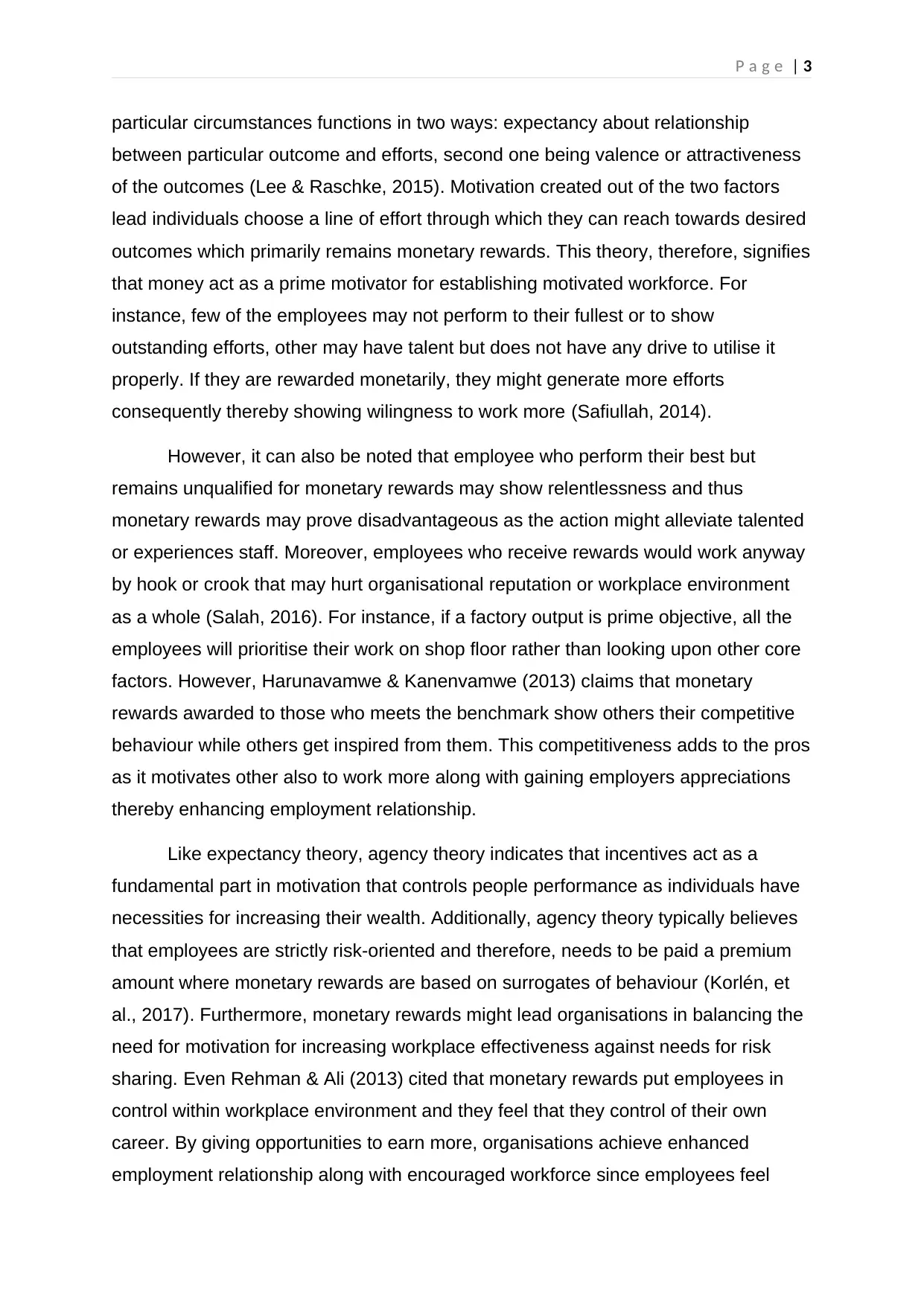
P a g e | 3
particular circumstances functions in two ways: expectancy about relationship
between particular outcome and efforts, second one being valence or attractiveness
of the outcomes (Lee & Raschke, 2015). Motivation created out of the two factors
lead individuals choose a line of effort through which they can reach towards desired
outcomes which primarily remains monetary rewards. This theory, therefore, signifies
that money act as a prime motivator for establishing motivated workforce. For
instance, few of the employees may not perform to their fullest or to show
outstanding efforts, other may have talent but does not have any drive to utilise it
properly. If they are rewarded monetarily, they might generate more efforts
consequently thereby showing wilingness to work more (Safiullah, 2014).
However, it can also be noted that employee who perform their best but
remains unqualified for monetary rewards may show relentlessness and thus
monetary rewards may prove disadvantageous as the action might alleviate talented
or experiences staff. Moreover, employees who receive rewards would work anyway
by hook or crook that may hurt organisational reputation or workplace environment
as a whole (Salah, 2016). For instance, if a factory output is prime objective, all the
employees will prioritise their work on shop floor rather than looking upon other core
factors. However, Harunavamwe & Kanenvamwe (2013) claims that monetary
rewards awarded to those who meets the benchmark show others their competitive
behaviour while others get inspired from them. This competitiveness adds to the pros
as it motivates other also to work more along with gaining employers appreciations
thereby enhancing employment relationship.
Like expectancy theory, agency theory indicates that incentives act as a
fundamental part in motivation that controls people performance as individuals have
necessities for increasing their wealth. Additionally, agency theory typically believes
that employees are strictly risk-oriented and therefore, needs to be paid a premium
amount where monetary rewards are based on surrogates of behaviour (Korlén, et
al., 2017). Furthermore, monetary rewards might lead organisations in balancing the
need for motivation for increasing workplace effectiveness against needs for risk
sharing. Even Rehman & Ali (2013) cited that monetary rewards put employees in
control within workplace environment and they feel that they control of their own
career. By giving opportunities to earn more, organisations achieve enhanced
employment relationship along with encouraged workforce since employees feel
particular circumstances functions in two ways: expectancy about relationship
between particular outcome and efforts, second one being valence or attractiveness
of the outcomes (Lee & Raschke, 2015). Motivation created out of the two factors
lead individuals choose a line of effort through which they can reach towards desired
outcomes which primarily remains monetary rewards. This theory, therefore, signifies
that money act as a prime motivator for establishing motivated workforce. For
instance, few of the employees may not perform to their fullest or to show
outstanding efforts, other may have talent but does not have any drive to utilise it
properly. If they are rewarded monetarily, they might generate more efforts
consequently thereby showing wilingness to work more (Safiullah, 2014).
However, it can also be noted that employee who perform their best but
remains unqualified for monetary rewards may show relentlessness and thus
monetary rewards may prove disadvantageous as the action might alleviate talented
or experiences staff. Moreover, employees who receive rewards would work anyway
by hook or crook that may hurt organisational reputation or workplace environment
as a whole (Salah, 2016). For instance, if a factory output is prime objective, all the
employees will prioritise their work on shop floor rather than looking upon other core
factors. However, Harunavamwe & Kanenvamwe (2013) claims that monetary
rewards awarded to those who meets the benchmark show others their competitive
behaviour while others get inspired from them. This competitiveness adds to the pros
as it motivates other also to work more along with gaining employers appreciations
thereby enhancing employment relationship.
Like expectancy theory, agency theory indicates that incentives act as a
fundamental part in motivation that controls people performance as individuals have
necessities for increasing their wealth. Additionally, agency theory typically believes
that employees are strictly risk-oriented and therefore, needs to be paid a premium
amount where monetary rewards are based on surrogates of behaviour (Korlén, et
al., 2017). Furthermore, monetary rewards might lead organisations in balancing the
need for motivation for increasing workplace effectiveness against needs for risk
sharing. Even Rehman & Ali (2013) cited that monetary rewards put employees in
control within workplace environment and they feel that they control of their own
career. By giving opportunities to earn more, organisations achieve enhanced
employment relationship along with encouraged workforce since employees feel
Paraphrase This Document
Need a fresh take? Get an instant paraphrase of this document with our AI Paraphraser
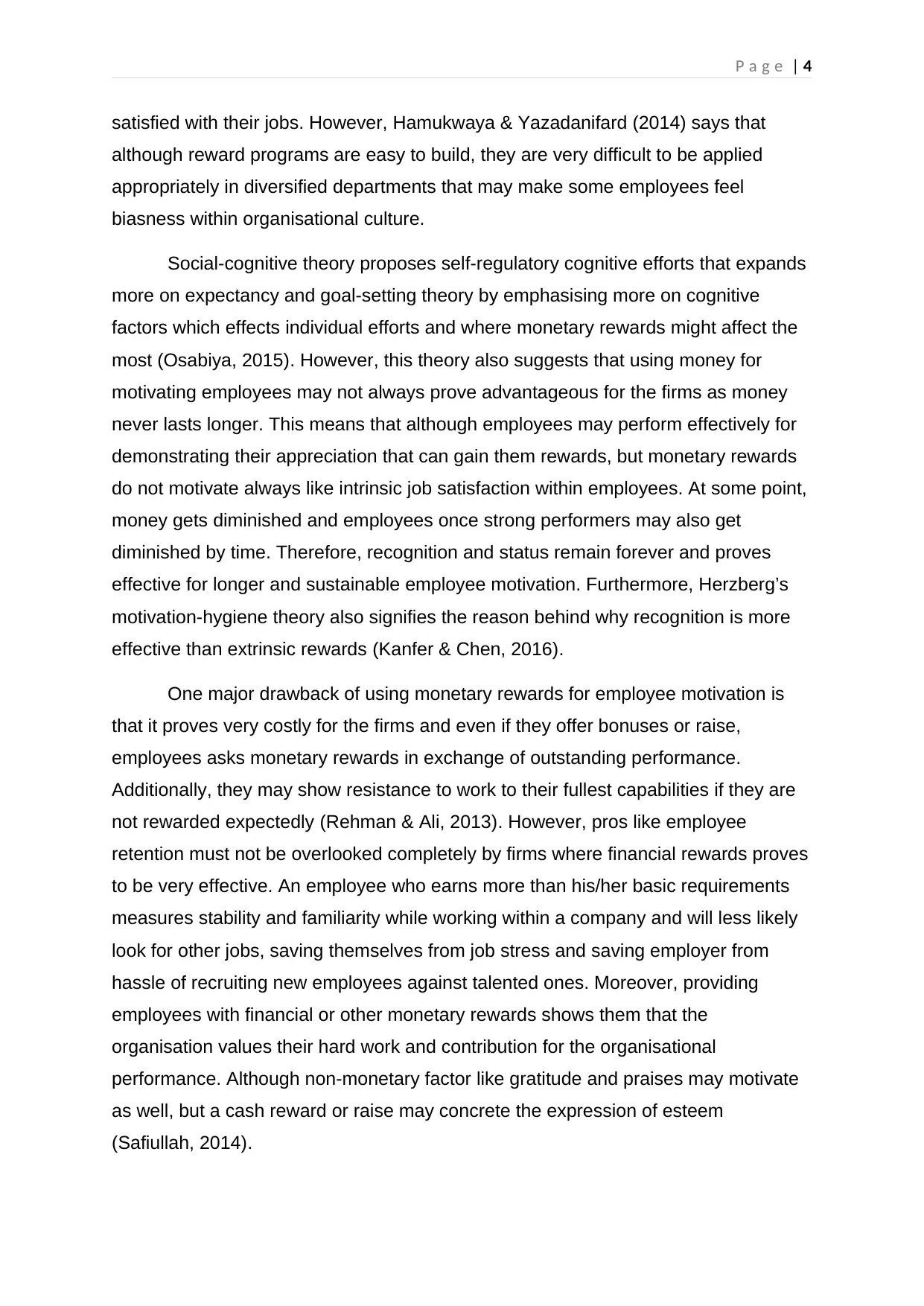
P a g e | 4
satisfied with their jobs. However, Hamukwaya & Yazadanifard (2014) says that
although reward programs are easy to build, they are very difficult to be applied
appropriately in diversified departments that may make some employees feel
biasness within organisational culture.
Social-cognitive theory proposes self-regulatory cognitive efforts that expands
more on expectancy and goal-setting theory by emphasising more on cognitive
factors which effects individual efforts and where monetary rewards might affect the
most (Osabiya, 2015). However, this theory also suggests that using money for
motivating employees may not always prove advantageous for the firms as money
never lasts longer. This means that although employees may perform effectively for
demonstrating their appreciation that can gain them rewards, but monetary rewards
do not motivate always like intrinsic job satisfaction within employees. At some point,
money gets diminished and employees once strong performers may also get
diminished by time. Therefore, recognition and status remain forever and proves
effective for longer and sustainable employee motivation. Furthermore, Herzberg’s
motivation-hygiene theory also signifies the reason behind why recognition is more
effective than extrinsic rewards (Kanfer & Chen, 2016).
One major drawback of using monetary rewards for employee motivation is
that it proves very costly for the firms and even if they offer bonuses or raise,
employees asks monetary rewards in exchange of outstanding performance.
Additionally, they may show resistance to work to their fullest capabilities if they are
not rewarded expectedly (Rehman & Ali, 2013). However, pros like employee
retention must not be overlooked completely by firms where financial rewards proves
to be very effective. An employee who earns more than his/her basic requirements
measures stability and familiarity while working within a company and will less likely
look for other jobs, saving themselves from job stress and saving employer from
hassle of recruiting new employees against talented ones. Moreover, providing
employees with financial or other monetary rewards shows them that the
organisation values their hard work and contribution for the organisational
performance. Although non-monetary factor like gratitude and praises may motivate
as well, but a cash reward or raise may concrete the expression of esteem
(Safiullah, 2014).
satisfied with their jobs. However, Hamukwaya & Yazadanifard (2014) says that
although reward programs are easy to build, they are very difficult to be applied
appropriately in diversified departments that may make some employees feel
biasness within organisational culture.
Social-cognitive theory proposes self-regulatory cognitive efforts that expands
more on expectancy and goal-setting theory by emphasising more on cognitive
factors which effects individual efforts and where monetary rewards might affect the
most (Osabiya, 2015). However, this theory also suggests that using money for
motivating employees may not always prove advantageous for the firms as money
never lasts longer. This means that although employees may perform effectively for
demonstrating their appreciation that can gain them rewards, but monetary rewards
do not motivate always like intrinsic job satisfaction within employees. At some point,
money gets diminished and employees once strong performers may also get
diminished by time. Therefore, recognition and status remain forever and proves
effective for longer and sustainable employee motivation. Furthermore, Herzberg’s
motivation-hygiene theory also signifies the reason behind why recognition is more
effective than extrinsic rewards (Kanfer & Chen, 2016).
One major drawback of using monetary rewards for employee motivation is
that it proves very costly for the firms and even if they offer bonuses or raise,
employees asks monetary rewards in exchange of outstanding performance.
Additionally, they may show resistance to work to their fullest capabilities if they are
not rewarded expectedly (Rehman & Ali, 2013). However, pros like employee
retention must not be overlooked completely by firms where financial rewards proves
to be very effective. An employee who earns more than his/her basic requirements
measures stability and familiarity while working within a company and will less likely
look for other jobs, saving themselves from job stress and saving employer from
hassle of recruiting new employees against talented ones. Moreover, providing
employees with financial or other monetary rewards shows them that the
organisation values their hard work and contribution for the organisational
performance. Although non-monetary factor like gratitude and praises may motivate
as well, but a cash reward or raise may concrete the expression of esteem
(Safiullah, 2014).
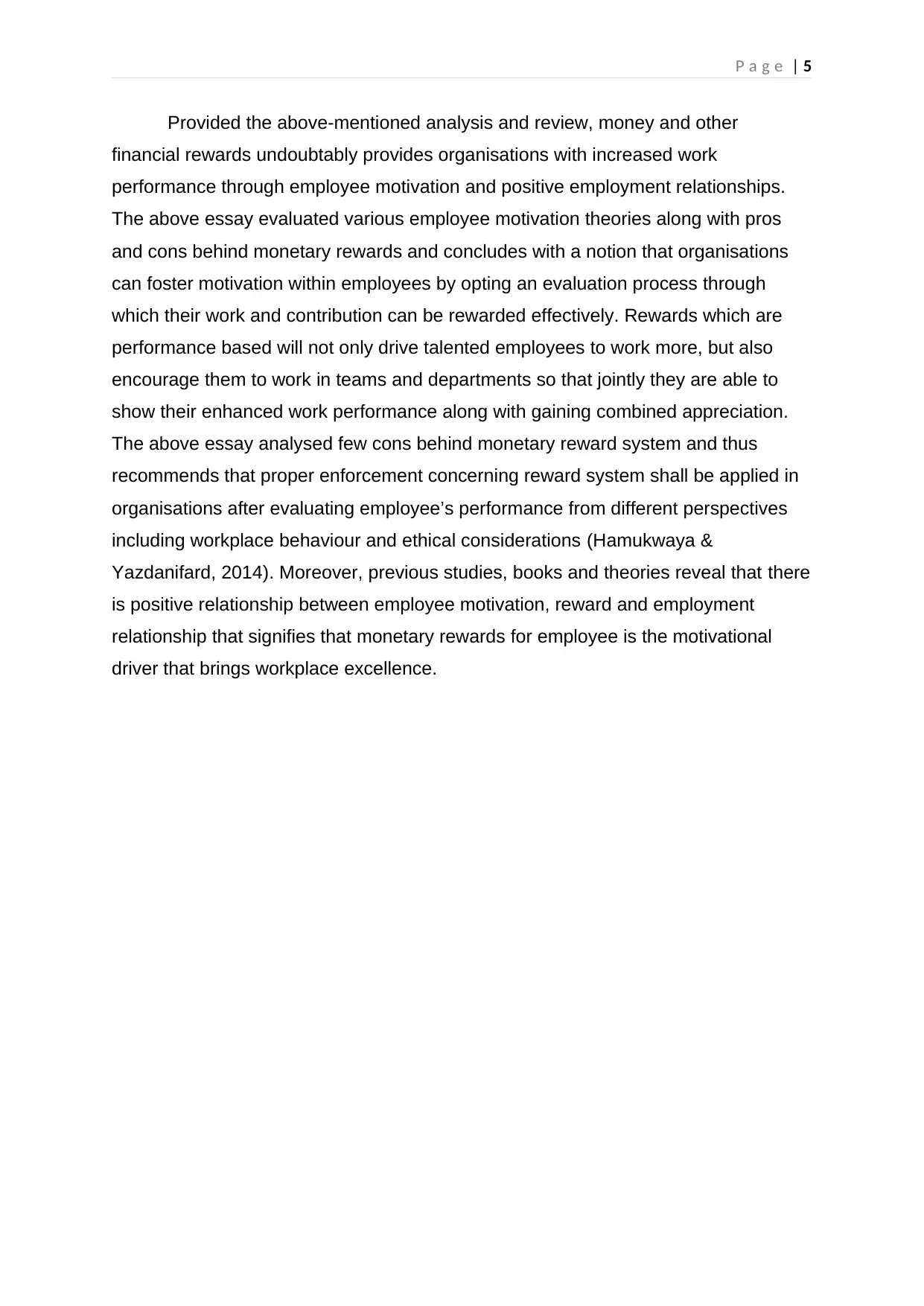
P a g e | 5
Provided the above-mentioned analysis and review, money and other
financial rewards undoubtably provides organisations with increased work
performance through employee motivation and positive employment relationships.
The above essay evaluated various employee motivation theories along with pros
and cons behind monetary rewards and concludes with a notion that organisations
can foster motivation within employees by opting an evaluation process through
which their work and contribution can be rewarded effectively. Rewards which are
performance based will not only drive talented employees to work more, but also
encourage them to work in teams and departments so that jointly they are able to
show their enhanced work performance along with gaining combined appreciation.
The above essay analysed few cons behind monetary reward system and thus
recommends that proper enforcement concerning reward system shall be applied in
organisations after evaluating employee’s performance from different perspectives
including workplace behaviour and ethical considerations (Hamukwaya &
Yazdanifard, 2014). Moreover, previous studies, books and theories reveal that there
is positive relationship between employee motivation, reward and employment
relationship that signifies that monetary rewards for employee is the motivational
driver that brings workplace excellence.
Provided the above-mentioned analysis and review, money and other
financial rewards undoubtably provides organisations with increased work
performance through employee motivation and positive employment relationships.
The above essay evaluated various employee motivation theories along with pros
and cons behind monetary rewards and concludes with a notion that organisations
can foster motivation within employees by opting an evaluation process through
which their work and contribution can be rewarded effectively. Rewards which are
performance based will not only drive talented employees to work more, but also
encourage them to work in teams and departments so that jointly they are able to
show their enhanced work performance along with gaining combined appreciation.
The above essay analysed few cons behind monetary reward system and thus
recommends that proper enforcement concerning reward system shall be applied in
organisations after evaluating employee’s performance from different perspectives
including workplace behaviour and ethical considerations (Hamukwaya &
Yazdanifard, 2014). Moreover, previous studies, books and theories reveal that there
is positive relationship between employee motivation, reward and employment
relationship that signifies that monetary rewards for employee is the motivational
driver that brings workplace excellence.
⊘ This is a preview!⊘
Do you want full access?
Subscribe today to unlock all pages.

Trusted by 1+ million students worldwide
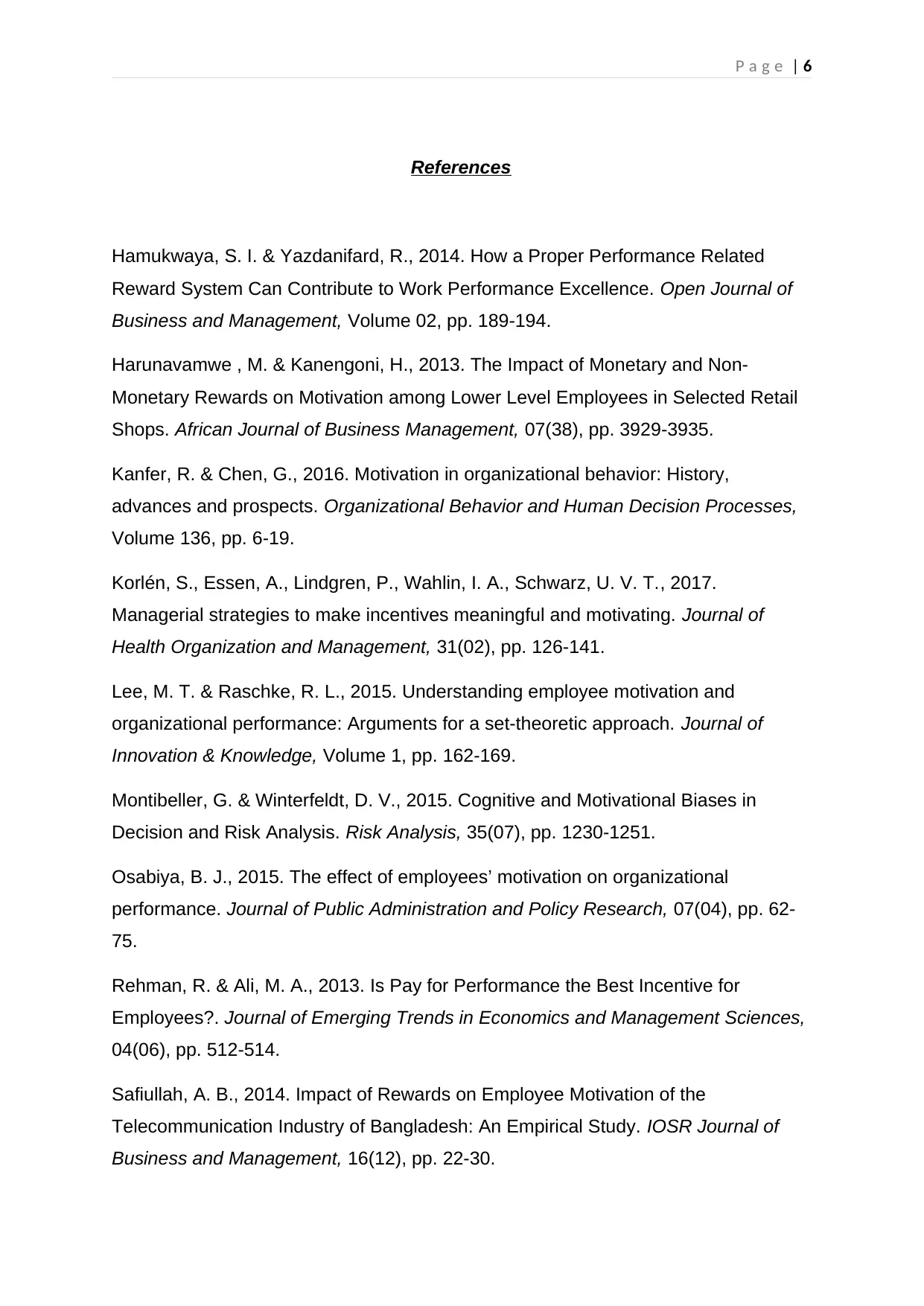
P a g e | 6
References
Hamukwaya, S. I. & Yazdanifard, R., 2014. How a Proper Performance Related
Reward System Can Contribute to Work Performance Excellence. Open Journal of
Business and Management, Volume 02, pp. 189-194.
Harunavamwe , M. & Kanengoni, H., 2013. The Impact of Monetary and Non-
Monetary Rewards on Motivation among Lower Level Employees in Selected Retail
Shops. African Journal of Business Management, 07(38), pp. 3929-3935.
Kanfer, R. & Chen, G., 2016. Motivation in organizational behavior: History,
advances and prospects. Organizational Behavior and Human Decision Processes,
Volume 136, pp. 6-19.
Korlén, S., Essen, A., Lindgren, P., Wahlin, I. A., Schwarz, U. V. T., 2017.
Managerial strategies to make incentives meaningful and motivating. Journal of
Health Organization and Management, 31(02), pp. 126-141.
Lee, M. T. & Raschke, R. L., 2015. Understanding employee motivation and
organizational performance: Arguments for a set-theoretic approach. Journal of
Innovation & Knowledge, Volume 1, pp. 162-169.
Montibeller, G. & Winterfeldt, D. V., 2015. Cognitive and Motivational Biases in
Decision and Risk Analysis. Risk Analysis, 35(07), pp. 1230-1251.
Osabiya, B. J., 2015. The effect of employees’ motivation on organizational
performance. Journal of Public Administration and Policy Research, 07(04), pp. 62-
75.
Rehman, R. & Ali, M. A., 2013. Is Pay for Performance the Best Incentive for
Employees?. Journal of Emerging Trends in Economics and Management Sciences,
04(06), pp. 512-514.
Safiullah, A. B., 2014. Impact of Rewards on Employee Motivation of the
Telecommunication Industry of Bangladesh: An Empirical Study. IOSR Journal of
Business and Management, 16(12), pp. 22-30.
References
Hamukwaya, S. I. & Yazdanifard, R., 2014. How a Proper Performance Related
Reward System Can Contribute to Work Performance Excellence. Open Journal of
Business and Management, Volume 02, pp. 189-194.
Harunavamwe , M. & Kanengoni, H., 2013. The Impact of Monetary and Non-
Monetary Rewards on Motivation among Lower Level Employees in Selected Retail
Shops. African Journal of Business Management, 07(38), pp. 3929-3935.
Kanfer, R. & Chen, G., 2016. Motivation in organizational behavior: History,
advances and prospects. Organizational Behavior and Human Decision Processes,
Volume 136, pp. 6-19.
Korlén, S., Essen, A., Lindgren, P., Wahlin, I. A., Schwarz, U. V. T., 2017.
Managerial strategies to make incentives meaningful and motivating. Journal of
Health Organization and Management, 31(02), pp. 126-141.
Lee, M. T. & Raschke, R. L., 2015. Understanding employee motivation and
organizational performance: Arguments for a set-theoretic approach. Journal of
Innovation & Knowledge, Volume 1, pp. 162-169.
Montibeller, G. & Winterfeldt, D. V., 2015. Cognitive and Motivational Biases in
Decision and Risk Analysis. Risk Analysis, 35(07), pp. 1230-1251.
Osabiya, B. J., 2015. The effect of employees’ motivation on organizational
performance. Journal of Public Administration and Policy Research, 07(04), pp. 62-
75.
Rehman, R. & Ali, M. A., 2013. Is Pay for Performance the Best Incentive for
Employees?. Journal of Emerging Trends in Economics and Management Sciences,
04(06), pp. 512-514.
Safiullah, A. B., 2014. Impact of Rewards on Employee Motivation of the
Telecommunication Industry of Bangladesh: An Empirical Study. IOSR Journal of
Business and Management, 16(12), pp. 22-30.
Paraphrase This Document
Need a fresh take? Get an instant paraphrase of this document with our AI Paraphraser
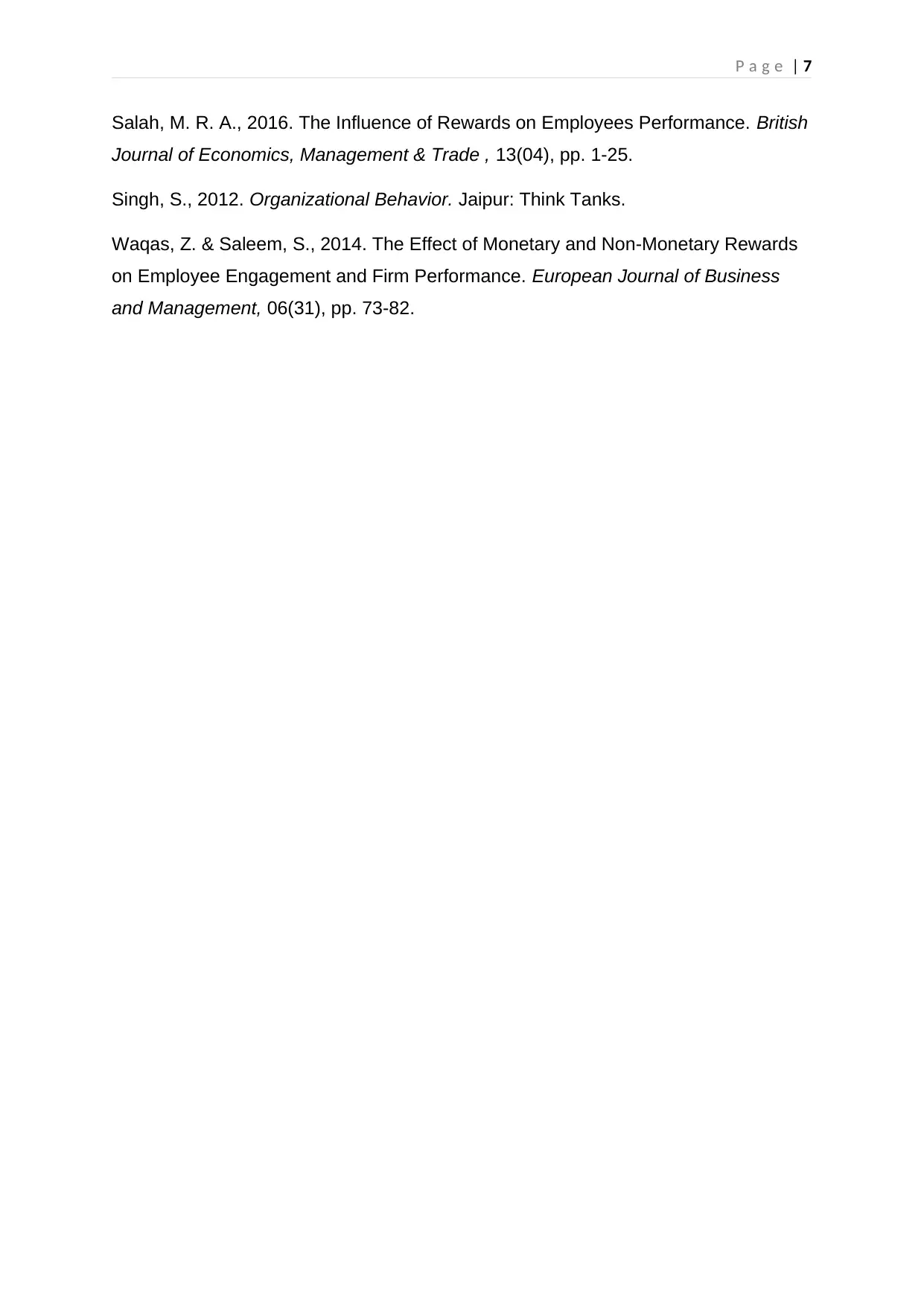
P a g e | 7
Salah, M. R. A., 2016. The Influence of Rewards on Employees Performance. British
Journal of Economics, Management & Trade , 13(04), pp. 1-25.
Singh, S., 2012. Organizational Behavior. Jaipur: Think Tanks.
Waqas, Z. & Saleem, S., 2014. The Effect of Monetary and Non-Monetary Rewards
on Employee Engagement and Firm Performance. European Journal of Business
and Management, 06(31), pp. 73-82.
Salah, M. R. A., 2016. The Influence of Rewards on Employees Performance. British
Journal of Economics, Management & Trade , 13(04), pp. 1-25.
Singh, S., 2012. Organizational Behavior. Jaipur: Think Tanks.
Waqas, Z. & Saleem, S., 2014. The Effect of Monetary and Non-Monetary Rewards
on Employee Engagement and Firm Performance. European Journal of Business
and Management, 06(31), pp. 73-82.
1 out of 8
Related Documents
Your All-in-One AI-Powered Toolkit for Academic Success.
+13062052269
info@desklib.com
Available 24*7 on WhatsApp / Email
![[object Object]](/_next/static/media/star-bottom.7253800d.svg)
Unlock your academic potential
Copyright © 2020–2026 A2Z Services. All Rights Reserved. Developed and managed by ZUCOL.





